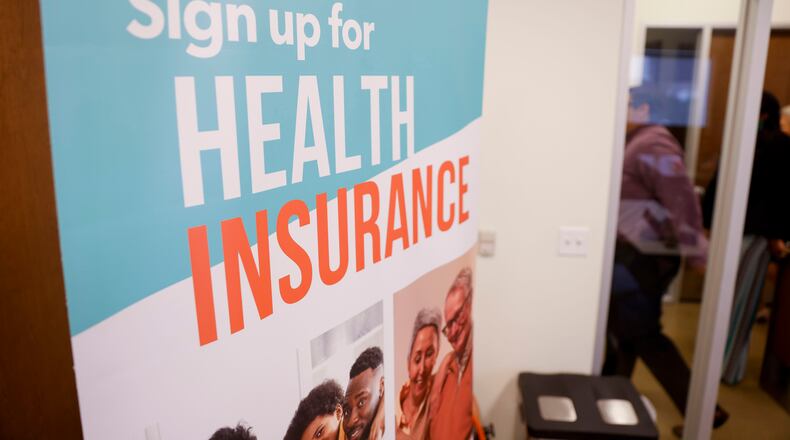Companies under suspicion of misleading customers and improperly exporting their data to other countries are approved to be among the insurance enrollment companies allowed to sell Georgians Affordable Care Act health insurance plans beginning in November.
About 1.3 million Georgians currently are enrolled in Affordable Care Act plans. The plans previously were offered through a federal website, healthcare.gov. That will change starting Nov. 1, when the state of Georgia takes over the enrollment process here.
This week, the state Office of the Commissioner of Insurance and its ACA office, Georgia Access, announced the 18 insurance companies and web brokers that Georgians will be able to pick from on the state-run exchange website, Georgiaaccess.gov. Among them will be the health insurance shopping websites Benefitalign and Inshura. Those companies were banned last month by the federal government from using healthcare.gov’s database to enroll clients. The ban came after federal inquiries and a civil lawsuit produced evidence of what the lawsuit plaintiffs called fraud.
In a court appeal, the companies called the ban from healthcare.gov “a lawless decision that threatens to put them out of business.” The companies said the decision by federal officials was based on “a litany of fears, suspicions and possibilities, the unsupported allegations of civil litigation.”
The federal Centers for Medicare and Medicaid Services, which oversees healthcare.gov, told the companies that while it investigates them, the “serious risk” to consumers was real enough that they would remain suspended. Concerns raised about the companies are only allegations for now while an audit is conducted.
The ban is temporary until CMS completes its investigation. Depending on the conclusions, the ban could be left in place or lifted. It’s not clear how long the investigation could take.
The federal letter suspending Benefitalign and Inshura referred to the problem companies as “the Speridian companies.” California-based Speridian Global Holdings owns Benefitalign, an enrollment platform, and TrueCoverage, which also does business as an enrollment platform under the name Inshura. Speridian has a data center in India. Georgia plaintiffs in the lawsuit also cited Enhance Health, another company that worked with Benefitalign and TrueCoverage.
“The Speridian Companies have a history of noncompliance with CMS regulations and agreements dating back to 2018,” the letter said.
The letter cites a civil lawsuit alleging that the company engaged in insurance fraud. The lawsuit says the Speridian companies misled people into thinking they would get cash if they enrolled in new insurance, and that the companies even secretly enrolled people without their knowledge. In fact, the suit claims, there was no cash; the new plans cost the consumers much-needed coverage; and the consumers were sometimes on the hook for huge tax penalties.
In addition, the federal agency said it has reason to believe the company was improperly exporting ACA customers’ data to other countries. It cites evidence that the data may have accessed by people in Hong Kong, which is under the control of China, as well as India, Ireland, Japan, Pakistan, and Sweden. That customer data is required to be kept in the U.S. and can include such data as names, Social Security numbers and birthdates.
The company protested in court but the court case remains unresolved.
Callie Navrides is an insurance agent in Augusta who says her clients were stolen from her by brokers working with Benefitalign and put into plans that cost the clients good coverage. Navrides said she was appalled that Georgia had approved the companies for the state exchange just as the feds had suspended them.
“I mean, I think it’s pretty reckless,” said Navrides, who is part of the lawsuit. Navrides said she had tried to file complaints with the Georgia Office of Insurance but was told it was a growing problem in the industry and that the office wouldn’t investigate. “It just makes me feel like Georgia’s not actually doing enough to protect consumers,” Navrides said.
Credit: courtesy
Credit: courtesy
Navrides said when she thinks about having her clients stolen so a scammer can get her agent fee, it’s not about the policies she’s lost. “I think about my diabetic clients who are going in to get their medication and they’re told their insurance won’t pay for it and they have to wait two weeks,” she said. “They’re putting their life at risk. And I’m frantically working to sort it out.”
Navrides said she has mostly abandoned ACA business because she can’t afford the time to unwind the frauds.
A spokesman for the Office of the Commissioner of Insurance Ethan Stiles said the banned companies were included on Georgia Access’s approved list because the state accepted every company that applied that met the state’s requirements. Stiles pointed out that the companies had only been suspended by the feds, not permanently revoked.
“In the event CMS revokes their certification, Georgia Access can respond accordingly,” Stiles said in an email. “Georgia Access has the option to suspend or terminate partner access in cases in which the highest standards are not maintained.”
He would not say whether the state intended to do that if the feds did permanently revoke their status. “Georgia Access continues to monitor this developing situation and engage in active, ongoing communication with CMS to receive updates and gather critical information necessary to make responsible decisions going forward,” Stiles said.
Beginning Nov. 1, Georgia’s system will take over all the ACA processing for the state’s ACA consumers from healthcare.gov. But it still is a partnership that must be approved by the federal agency. A Georgetown professor who studies ACA law said “the picture is a bit muddled” as to whether the state can legally use a company that the feds have banned. The federal CMS said it wouldn’t comment on pending litigation.
But professor Zachary Baron said while the federal investigation remains unresolved, “(t)he bigger question is whether Georgia feels like working with these web-brokers right now ... is in the best interest of Georgia residents.”
Tiesha Foreman is suing the Speridian companies over her contention that her husband repeatedly was switched into insurance that wouldn’t cover his illness. She says she feels like the state has failed consumers like her by allowing Benefitalign and TrueCoverage to operate here.
“It gives (consumers) a confidence level that somebody’s already vetted them,” she said. “You’re holding up at the state level that Georgia has done that for them. I’m just dumbfounded.”
About the Author
Keep Reading
The Latest
Featured




